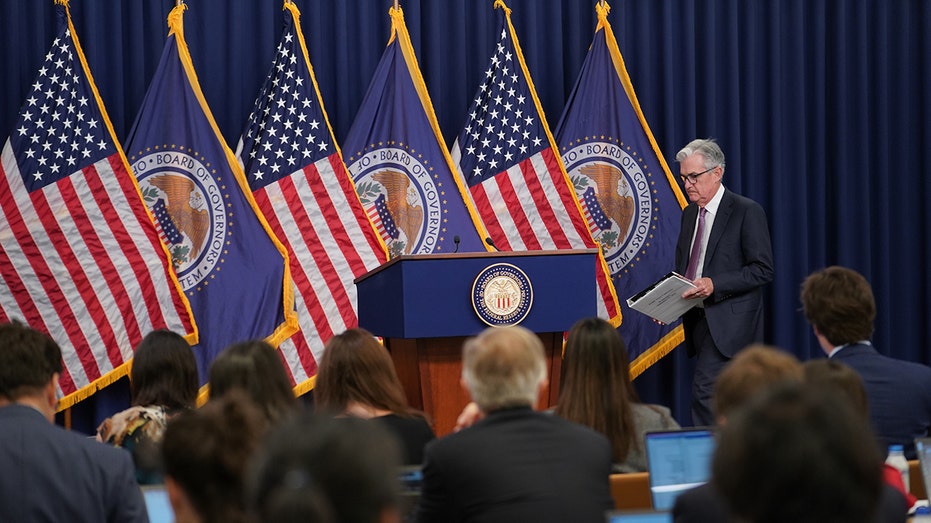Fed hikes interest rates by 75 basis points for fourth straight month
U.S. central bank continues its inflation-fighting campaign with another big rate hike
Fed is 'hellbent' on slowing inflation, analyst says
Former Treasury Department international economist David Beckworth discusses if the Fed is frustrated about not curbing inflation as much as they would like on 'Cavuto: Coast to Coast.'
The Federal Reserve on Wednesday raised its benchmark interest rate by 75 basis points for the fourth straight month as it struggles to bring runaway inflation under control, a move that threatens to further slow U.S. economic growth and exacerbate financial pain for millions of households and businesses.
The three-quarter percentage point hikes in June, July, September and November underscore just how serious Fed officials are about tackling the inflation crisis after a string of alarming economic reports. Policymakers voted unanimously to approve the latest super-sized hike.
The widely expected move puts the key benchmark federal funds rate at a range of 3.75% to 4%, the highest since before the 2008 financial crisis, from near-zero in March. It marks the sixth consecutive rate increase this year and puts interest rates in firmly restrictive territory.
However, the Fed also hinted at the possibility of smaller rate increases at future meetings as policymakers acknowledged that tighter monetary policy takes time to work its way through the economy, increasing the risk of a recession.
DEMOCRATS SLAM 'DANGEROUS' FED RATE HIKES, WARNING OF WIDESPREAD JOB LOSSES
"The Committee anticipates that ongoing increases in the target range will be appropriate in order to attain a stance of monetary policy that is sufficiently restrictive to return inflation to 2 percent over time," the Fed said in a new sentence added to its post-meeting statement.
Officials noted they will take into consideration "the cumulative tightening of monetary policy, the lags with which monetary policy affects economic activity and inflation and economic and financial developments" when determining how high to raise rates in the coming months.
The statement shift comes amid increased uncertainty about the health of the economy: Inflation remains painfully high and the labor market is still abnormally tight, but both the housing and manufacturing sectors are weakening.
SOCIAL SECURITY RECIPIENTS TO SEE BIGGEST COLA INCREASE SINCE 1981
"I've said at the last two press conferences that at some point it will become appropriate to slow the pace of increases," Chairman Jerome Powell told reporters during a press conference in Washington. "So that time is coming. And it may come as soon as the next meeting, or the one after that. No decision has been made."
Powell later added that it is "premature" to think about pausing interest rate hikes, noting that considering the lag in monetary policy does not mean Fed officials are prepared to stop raising interest rates.
"Let me say this," he said. "It is very premature to be thinking about pausing. When people hear lags, they think about pauses. It's very premature, in my view, to talk about pausing our rate hikes. We have a way to go."

Jerome Powell, chairman of the U.S. Federal Reserve, arrives to speak during a news conference following a Federal Open Market Committee (FOMC) meeting in Washington, D.C., US, on Wednesday, Sept 21, 2022. (Photographer: Sarah Silbiger/Bloomberg via Getty Images / Getty Images)
The Fed's efforts to cool the economy and wrestle inflation closer to its 2% target marks the most aggressive tightening campaign since the 1980s. But the efforts to combat inflation carry a potential risk of recession, and a growing number of economists and Wall Street firms are forecasting a downturn this year or next as the Fed tries to thread the needle between curbing inflation without crushing growth.
"It’s too hard," Tomas Philipson, a University of Chicago economist and the former chair of the White House Council of Economic Advisers, told FOX Business. "It’s not that the [Fed is] not capable. It’s just that it’s impossible to do. It’s like planning a wedding on a sunny day next summer. You can’t forecast the weather, and you can’t forecast the economy."
CLICK HERE TO READ MORE ON FOX BUSINESS
Inflation ran even hotter than expected last month, with the consumer price index, a broad measure of the price for everyday goods that includes gasoline, groceries and rents, increasing 0.4% in September from the previous month, dashing hopes for a slowdown. On an annual basis, inflation is running at 8.2% — a nearly 40-year high.
Hiking interest rates tends to create higher rates on consumer and business loans, which slows the economy by forcing employers to cut back on spending. Mortgage rates already have more than doubled from one year ago to more than 7%.





















